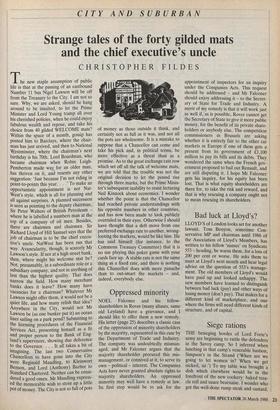CITY AND SUBURBAN
Strange tales of the forty gilded mats and the chief executive's uncle
CHRISTOPHER Fl LDES
The new staple assumption of public life is that at the passing of an eastbound Number 11 bus Nigel Lawson will be off from the Treasury to the City. I am not so sure. Why, we are asked, should he hang around to be insulted, to let the Prime Minister and Lord Young tramp all over his cherished policies, when he could enjoy fabulous wealth and repose, and take his choice from 40 gilded WELCOME mats? Within the space of a month, gossip has posted him to Barclays, where the chair- man has just arrived, and then to National Westminster, where the chairman's next birthday is his 70th. Lord Boardman, who became chairman when Robin Leigh- Pemberton made way, for an older man, has thriven on it, and resents any other suggestion: 'Just because I'm not riding in point-to-points this year. . . .' To make an opportunistic appointment is not Nat- West's style, which is all for planning and all against surprises. A planned succession is seen as pointing to the deputy chairman, Sir Peter Walters of British Petroleum where he is labelled a numbers man at the top of a company of oil men. Besides, there are chairmen and chairmen. Sir Richard Lloyd of Hill Samuel says that the job of chairman is to be the chief execu- tive's uncle. NatWest has been run that way. Avuncularity, though, is scarcely Mr Lawson's style. If not at a high street bank, then, where might his welcome mat be? Not, presumably, in a subordinate role or a subsidiary company, and not in anything of less than the highest quality. That does narrow the field. How many merchant banks does it leave? How many have vacancies for a chairman? Whatever Mr Lawson might offer them, it would not be a quiet life, and how many relish that idea? Anywhere in the City, would not Mr La. wson be (as one banker put it) an ocean liner sailing on a park pond? Submitting to the licensing procedures of the Financial Services Act, presenting himself as a fit and proper person to the Bank of Eng- land's supervisors, showing due deference to the Governor. . . . It all takes a bit of Imagining. The last two Conservative Chancellors to have gone into the City were Reginald Maudling, to Kleinwort Benson, and Lord (Anthony) Barber to Standard Chartered. Neither can be consi- dered a good omen. Mr Maudling express- ed the memorable wish to store up a little pot of money. The City is not so full of pots of money as those outside it think, and certainly not as full as it was, and not all the pots are wholesome. It is a mistake to suppose that a Chancellor can come and take his pick and, in political terms, be more effective as a threat than as a promise. As to the great exchange rate row which set off all the talk of welcome mats, we are told that the trouble was not the original decision to let the pound rise through three marks, but the Prime Minis- ter's subsequent inability to resist lecturing Neil Kinnock about economics. I wonder whether the point is that the Chancellor had reached private understandings with his opposite numbers in other countries, and has now been made to look publicly overruled in their eyes. Otherwise I should have thought that a deft move from one preferred exchange rate to another, wrong- footing the markets, would be like him. He has said himself (for instance, to the Commons Treasury Committee) that it is no use playing this poker game with your cards face up. A stable rate is not the same thing as a fixed rate, and there is nothing this Chancellor does with more panache than to out-smart the markets — and, indeed, everybody else.


















































 Previous page
Previous page